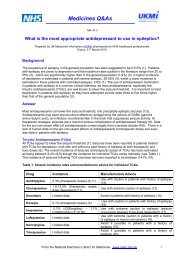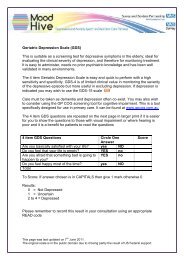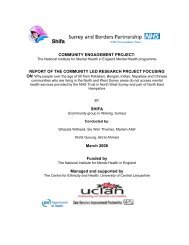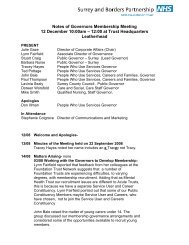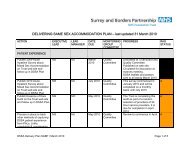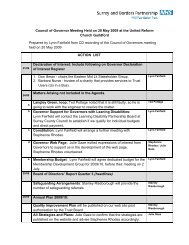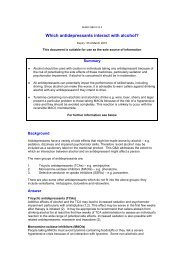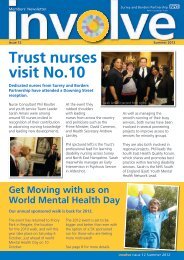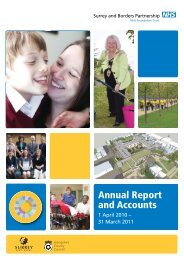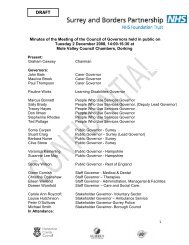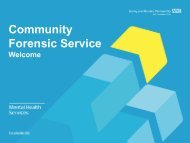Here - Surrey and Borders Partnership NHS Foundation Trust
Here - Surrey and Borders Partnership NHS Foundation Trust
Here - Surrey and Borders Partnership NHS Foundation Trust
You also want an ePaper? Increase the reach of your titles
YUMPU automatically turns print PDFs into web optimized ePapers that Google loves.
Commentary <strong>and</strong> Debate<br />
How can we look at improving<br />
recruitment into psychiatry?<br />
January 2009<br />
By Josie Jenkinson<br />
If recent figures are to be believed, fewer<br />
UK graduates are entering higher<br />
specialist training in psychiatry than ever<br />
before. Just 6% of c<strong>and</strong>idates sitting<br />
Paper 1 of the MRCPsych in diet one of<br />
2008 were UK graduates (Oxtoby, 2008),<br />
<strong>and</strong> this is likely to be a national indicator<br />
of recruitment trends (Brown et al, 2009).<br />
This has lead to widespread attention<br />
being focused on potential ways of<br />
improving recruitment into psychiatry,<br />
<strong>and</strong> the Royal College of Psychiatrists<br />
having taken specific steps to address the<br />
issue (Royal College of Psychiatrists,<br />
2009).<br />
The current recruitment crisis is by no<br />
means a new problem. In fact, concerns<br />
regarding poor recruitment into<br />
psychiatry have been discussed since the<br />
1970’s <strong>and</strong> there have been similar issues<br />
in other countries, most notably in the<br />
USA (Brockington, 2002). As a result,<br />
there has been a substantial amount<br />
written on the subject of recruitment into<br />
psychiatry. Much of the literature has<br />
been concerned with identifying the<br />
factors influencing the choice of<br />
psychiatry as a career as well as<br />
suggesting strategies that might be<br />
adopted to improve recruitment based on<br />
these factors. However, in the light of<br />
ongoing change within the <strong>NHS</strong> <strong>and</strong><br />
medical education, as well as a current<br />
climate of doubt <strong>and</strong> uncertainty as to<br />
the future role of the psychiatrist this is a<br />
very real <strong>and</strong> current issue facing the<br />
profession. Increasing reliance on<br />
international medical graduates to<br />
support <strong>and</strong> maintain delivery of<br />
psychiatric care increases the pressure to<br />
improve the current situation even<br />
further, given the possible impact of<br />
Home Office immigration policy changes<br />
(Brown et al, 2009).<br />
Any strategy aimed at improving<br />
recruitment into psychiatry would need<br />
to take into account the possible reasons<br />
why people choose psychiatry as a career,<br />
as well as what might deter them. This<br />
may be difficult as processes which<br />
influence doctors in their choice of career<br />
have been described as “subtle <strong>and</strong><br />
complex” (Eagles 2007), however I shall<br />
outline some of the possibilities below.<br />
Prior to entering medical school, many<br />
specialties including psychiatry are rated<br />
as a very attractive option (Maidment et<br />
al, 2003). However, this attitude is not<br />
maintained throughout the years of<br />
undergraduate training, with medical<br />
students tending to develop more<br />
negative attitudes about the specialty<br />
(Brockington, 2002). This may in part be<br />
due to the negative attitudes towards the<br />
profession from non-psychiatrists <strong>and</strong><br />
even psychiatrists themselves, for<br />
example describing psychiatrists as ‘not<br />
proper doctors’ (Craddock, 2008 p70).<br />
This is confounded by the sadly ever<br />
present stigma surrounding those with<br />
mental health problems <strong>and</strong> those who<br />
treat them, which medical students are<br />
exposed to both inside <strong>and</strong> outside of<br />
their training (Brockington, 2002). Four<br />
broad categories of negative opinions<br />
surrounding psychiatry as a specialty have<br />
been identified amongst medical<br />
students. These are related to the<br />
assumption that psychiatry lacks<br />
objectivity <strong>and</strong> is unscientific, that<br />
treatments are ineffective, that<br />
psychiatrists are ‘emotionally unstable’<br />
<strong>and</strong> ‘second rate’ doctors, <strong>and</strong> a dislike of<br />
the patient population treated by<br />
psychiatrists (Scott, 1986 p99).<br />
However, undergraduate exposure to<br />
psychiatry seems to be particularly<br />
important as a potentially positive<br />
influence, with consultants in psychiatry<br />
citing a lasting influence of medical<br />
24 <strong>Surrey</strong> <strong>and</strong> <strong>Borders</strong> Online Journal www.sabp.nhs.uk/journal



